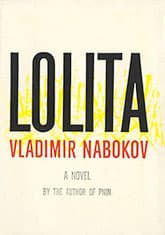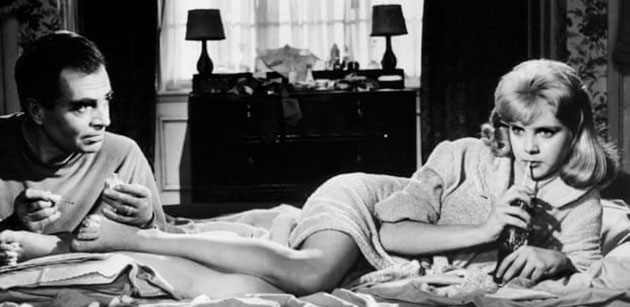Lolita
Critique • Quotes • At the movies
 First U.S. edition 1958
First U.S. edition 1958First publication
1955, France
First U.S. publication
1958
Literary form
Novel
Genre
Literary
Writing language
English
Author's country
Russia, United States, Switzerland
Length
Approx. 112,000 words

James Mason is the sophisticated pedophile and Sue Lyon is his love object in 1962 film of Lolita.
Humbert Humbert on a tightrope
Lolita (1962): Film, 152 minutes; director Stanley Kubrick; writer Vladimir Nabokov; featuring James Mason, Sue Lyon, Shelley Winters, Peter Sellers
It's odd the movie treatment of Lolita deviating most from the novel was actually written by the novel's author. Director Stanley Kubrick and producer James Harris are known to have rearranged and rewritten much of the script, but with Vladimir Nabokov's approval.
Or perhaps it's not so strange, given this first film of Lolita came out in the early 1960s when filmmakers had to be circumspect in addressing on the big screen the scandalous subject matter of such a book. Steps had to be taken to play down the pedophiliac eroticism of the novel and make Humbert Humbert more likable and less of a predator. Writer, director and actors had to perform a balancing act between intriguing and offending its audiences.
They succeeded, for the film was a commercial success at the time and is still greatly admired as art.
The eroticism is downplayed almost to the point of disappearing. I remember as a young person watching it, wondering well into the film what was supposed to be so shocking about a middle-aged man having a Platonic relationship with a young girl he was fond of—until Kubrick's hints got through to me and I realized what was being left unseen.
It doesn't help that Humbert is played by the innately likable and decent-seeming James Mason. Mason brings a refinement to the role that does not fit the stereotype of a creep who preys on children. But to be fair, this cultured appearance is also part of Humbert's cover in the novel.
The film also plays with giving the impression that being enamoured with Lolita might be a new experience for Humbert. The ill-fated love when he was a teenager himself, which in the novel led to his sexual fixation on young girls, is left out of the film. And his subsequent quest for "nymphets", as he calls them, goes unmentioned until he meets Dolores Haze, his Lolita.
Humbert falls for the daughter of Charlotte Haze (Shelley Winters) in Lolita.
Instead of starting with Humbert's back story, Kubrick opens the film with the shooting of Clare Quilty (from the end of the novel), showing that Humbert was to become a murderer and leaving the earlier story—from Humbert coming to live with mother and daughter Haze through to the bitter end—told in flashback to play as a justification of his ultimate crime.
We never really get inside Humbert's head to see his self-delusions and doubts as we do in the novel. Mason's reserved Humbert seems unaware of any trauma Lolita is going through or shows little understanding that she should ever want to leave him. He also seems not to fear the chasm that could open under him at any point—until it does.
The role of his rival Quilty is greatly extended in the film. Portrayed as a sashaying eccentric by comic actor Peter Sellers, adopting various outlandish disguises, Quilty steps forward from the shadows, where he dwells in the novel, to interact with the other characters in the spotlight, including Lolita's mother, played movingly by Shelley Winters in one of her best performances.
Also undercutting the story's scandalous theme in this film is the maturing of Lolita—age twelve in the book, acted by Sue Lyon when she's fourteen and fifteen, but appearing more like sixteen or seventeen at times. Her purported age is left vague, but in the movie's updated 1950s setting, Lolita appears to be a typical teenager of the time, playing records, going to dances and making out with boys.
We can argue about it, but my impression is that the movie also gives credence to the claim that Lolita knowingly seduces Humbert, rather than the other way around—more so than the novel does.
Despite all these thematic fudges, the 1962 Lolita was acclaimed and is still highly regarded as the classic adaptation of Nabokov's provocative novel, mainly due to its great direction and solid acting in all the main roles.
(Although a later adaptation is closer to the novel's story and feel.)
— Eric
Critique • Quotes • At the movies
1962, 1997

